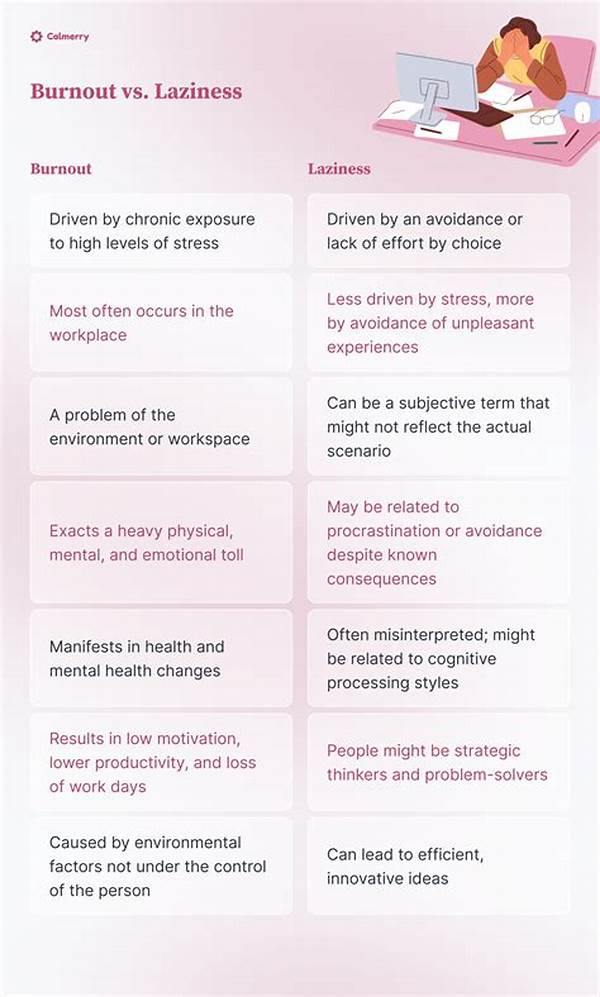Have you ever woken up in the morning feeling like staying in bed for just a few more minutes, only for those minutes to stretch out into hours? Do you often find yourself labeling these mornings as lazy, incapable of shaking off that morning inertia? What if I told you that these seemingly sluggish mornings might be telling a story far beyond just laziness? Yes, those relaxed, procrastinating hours might be cloaking something more profound and consequential: burnout. Burnout symptoms that masquerade as lazy mornings are more common than you might think, and they’re silently creeping into our daily lives.
Read More : Indonesia’s Growing Burnout Crisis Among Young Professionals
In today’s hustling and bustling world, where productivity is the buzzword and accomplishments foster accolades, many find themselves teetering on the edge of exhaustion in the quest for success. What often begins as passion and drive can swiftly turn into a relentless cycle, leaving individuals drained and yearning for respite. This burnout manifests in many ways, one of which is transforming an individual into what appears to be a sloth impersonator each morning. However, the reality is not that simple. We’ve been conditioned to associate prolonged morning rests with idleness, but often these are hidden cries for help from our tired minds and bodies.
Our culture loves tagging such behavior as lazy, often accompanied by guilt and self-criticism. When was the last time you took a step back and asked, “Am I lazy, or is my body demanding recovery?” These mornings of burnout symptoms that masquerade as lazy mornings are telling us to listen, to take heed of the mental and physical signals that demand our attention. Imagine this: your morning coffee loses its charm, your once favorite breakfast routine turns into a mere chore, and the vibrancy of early hours fades into a dull ambiance. This doesn’t necessarily mean you lacked motivation; it might mean you’ve been pushing too hard and for too long.
Recognizing the Culprits: What Lies Beneath Burnout Symptoms
Burnout is a state more insidious than pure exhaustion. It’s the culmination of prolonged stress with an adverse impact on the human psyche and physiology. Many professionals reveal that their lazy mornings are not just comforting snoozes but rather struggles with the heaviness of burnout. These mornings are battles where motivation is scarce, creativity is diminished, and simple tasks become monumental hurdles.
Structure and Exploration
Understanding Burnout Symptoms that Masquerade as Lazy Mornings
If asked, what do burnout symptoms that masquerade as lazy mornings look like? One might envision an individual snoozing their alarm for an hour, barely dragging themselves out of bed. However, experts in psychology and mental health professionals suggest these could indicate underlying exhaustion and not mere lethargy.
Unmasking the Reality of Burnout Symptoms
According to a study published in the Journal of Occupational Health Psychology, adults enduring high stress often report symptoms resembling fatigue and loss of motivation. They find themselves withholding self-criticism, assuming the mantle of laziness when, in truth, their body longs for rest. These mornings, veiled in sluggish calm, are the body’s silent plea to slow down, hinting at burnout symptoms that masquerade as lazy mornings.
Is It Really Laziness or Something Else?
When transitioning into a day, and every small task feels like climbing a mountain, it’s time to reassess why these mornings persist. Is it laziness, or do burnout symptoms lurk underneath? Many testimonials highlight how individuals misinterpret their body’s responses to stress and fatigue, labeling themselves negatively, and perpetuating a harmful cycle of criticism.
Seeking Professional Guidance
A pertinent question emerges: how do you differentiate between actual laziness and burnout? Experts advise observing patterns over time. Burnout tends to be accompanied by feelings of being overwhelmed, additional physical symptoms, and mental fatigue—not just reluctance to leave the comfort of one’s bed.
Examples of Burnout Symptoms
Anyone can endure burnout, manifesting in various ways that may appear like lazy mornings:
Grappling with My Own Mornings
Over the past few weeks, I’ve discovered my mornings are plagued not by laziness but by burnout symptoms that masquerade as lazy mornings. For instance, rising from bed felt like a Herculean task; decision-making was clouded by fatigue. These experiences pushed me to research more about burnout and seek ways to adjust my lifestyle accordingly.
The Professional Take
Interestingly, interviews with colleagues revealed similar experiences. Many confessed to masking their burnout symptoms as mere idleness without realizing the implications. After undergoing counseling and lifestyle adjustments, they reported significant improvements, both personally and professionally.
Strategies for Overcoming Morning Burnout
Tips for Addressing Lazy Morning Burnout
Assessing these insights is critical to understanding the wider story of morning burnout beyond laziness. Taking steps to address burnout leads to healthier lifestyles and more balanced living.
Crafting a Better Morning Experience
Ultimately, the goal is not to eliminate the story of lazy mornings but to rewrite it with a focus on wellness and recovery. By engaging in deeper, more honest conversations about what morning struggles mean, we can craft a morning narrative that upholds our health and dispels the myths of laziness engulfed in burnout. Acknowledge burnout symptoms that masquerade as lazy mornings for what they are—sounds of your life in need of tuning. Make every morning count by giving it the care, understanding, and attention it deserves.
